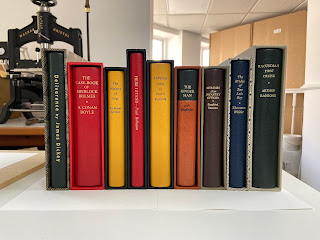I’m currently working on a project that involves the world of books and I’ve discussed aspects of this with a number of very helpful bookdealers. Among them is Stephen Conway, whose premises in central Halifax house a splendid second hand bookshop and also a bookbinding business. Given that my first literary award was the CWA Dagger bestowed on my short story ‘The Bookbinder’s Apprentice’, you can gather that this is a subject that has long fascinated me. Stephen kindly agreed to be interviewed about his work and there is so much info of interest that I’ve split it into two posts. This one is about bookbinding. Another, on second hand bookdealing, will follow at a later date.
1.
How did you get
involved with bookbinding?
I have been involved in Bookbinding now for almost 50 years, starting with a six-year apprenticeship in 1974. I became self employed in 1985 and have been running a small hand bookbinding business ever since. Over the years, we have worked on a variety of high profile
Projects,
including The Booker Prize and The Highgrove Florilegium, a limited edition
fine binding of 350 copies (2 volumes) for the Prince of Wales Trust. Over the
years, we have worked on many Private Press editions, as well as bespoke boxes,
in either cloth or leather for rare and valuable books. In fact, this has now
become a large part of our work load. Whilst the world climate is an
everchanging landscape, thankfully, the demand for high quality work still remains.
2.
What is the appeal
to you of being a bookbinder?
Not
being an academic and coming from a working-class family, I needed to find an
outlet for my interest in arts and crafts. I had ambition to attend Art
College, however, this never materialised and eventually I started work as an
apprentice bookbinder, working mainly on account books, still in use in the
early seventies. Luckily, this turned out to be a good move as I was able to
develop my craft skills, and later, put those skills to artistic use through
design bookbinding. Later in life,I served a four year term as President of
Designer Bookbinders, a society devoted to the art and craft of bookbinding.
3.
Some people might
think bookbinding is an old-fashioned craft. Do you think it is a dying art or
does it have a real future?
Although working methods and techniques are constantly improving and advances
made, the basic techniques and materials remain unchanged. As a commercial
venture, perhaps hand bookbinding is not an obvious choice, but it is an
extremely rewarding career option for young people coming into the trade. I
would say that hand bookbinding is as popular now as ever, if not, more so.
4.
From a bookbinder’s
point of view, what are the main do’s and dont’s about getting a book
professionally bound?
There are no easy answers to this,
as much depends on who is looking to have work done, be it a member of the
public with a family heirloom or Bible, a bookdealer or a private collector.
The criteria for each of these varies. Family heirlooms are repaired and
restored so that they can be passed down to future generations. For a bookdealer,
original condition is important and if work is required, must be sympathetic
and in keeping with the book. As for collectors, particularly collectors of
modern books with dust jackets, again, they look to finding the best copy
available, with the condition of the dust jacket being an important aspect in
terms of its appeal. In these instances, we make book boxes, either cloth or
leather, lined with archival materials to protect the book from further damage,
including sunlight fading, particularly jacket spines. Sometimes, the book may
need totally rebinding, but all options must be explored with discussion
between the client and the binder.
5.
And from a
customer’s point of view, what are the main do’s and don’ts?
The
only thing I would say is keep an open mind and explore the available options. Each
book is different and has to be looked at on an individual basis. In today’s
climate, costs have increased significantly, so making the right choices is
important.




2 comments:
I enjoyed that, Martin. Will be paying Stephen a visit soon
He's a fascinating chap and the shop is definitely worth visiting
Post a Comment